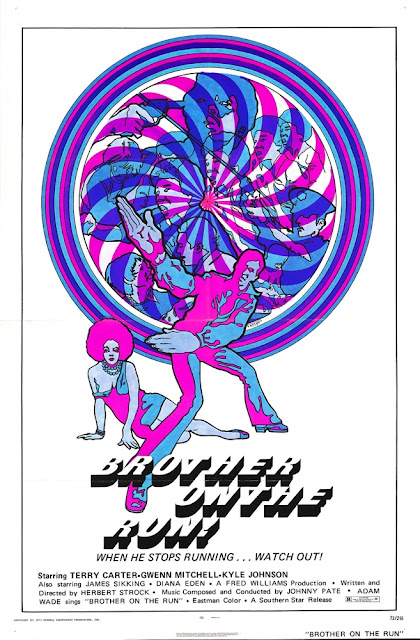Minor blaxploitation melodrama Brother on the Run doesn’t come anywhere close to fulfilling the promise of its fantastic title, and the reasons why begin with the premise. After an attempted robbery goes awry, leaving a shopkeeper dead, small-time crooks Billy (Kyle Johnson) and Frank (Gary Rist) become the targets of a police dragnet. For story reasons, it’s important to note that Billy is black. In scenes intercut with the robbery storyline, Brother on the Run sets up that college professor Grant (Terry Carter), who is also black, lives next door to a hooker named Maud (Gwenn Mitchell), with whom he’s casually acquainted. Maud is Billy’s older sister, so the fugitives try hiding at her place until the police come knocking. Grant gets hip to what’s going on, so he meets the crooks and becomes sympathetic to their plight. Then, once the manhunt resumes, Grant promises Maud that he’ll try to find Billy before the cops. All of this raises questions. Since Billy is guilty of at least being an accomplice, why does Grant get involved? Since Billy makes it clear at Maud’s place that he’s against surrendering to the cops, what is Grant’s plan once he tracks Billy down? And why does Grant stop in the middle of his search for Billy to service a horny white lady?
One assumes the filmmakers neither thought these questions through nor expected theatergoers to do so—more likely, the goal was to generate cheap thrills by exploiting the provocative notion that any black suspect running from white cops has a target on his back. Several passable blaxploitation flicks arose from that same notion, so the failure of Brother on the Run to generate excitement seems attributable to behind-the-camera carelessness as well as shortfalls in production resources. Cowritten and codirected by veteran TV guys Edward J. Lasko and Herbert L. Strock, the movie feels choppy, rushed, and under-budgeted; characterizations are laughably thin, the storyline is riddled with dopey coincidences, and the movie’s attempts at sociopolitical messaging are pathetic. (If only the filmmakers had leaned into bizarro moments such as the bit during which Maud provides gentle BDSM fun for a cross-dressing client.)
Offering marginal interest is the presence of actors better known for work they later did on the small screen. Playing the lead is Terry Carter, subsequently a regular on the original Battlestar Galactica series, and playing the main cop is James B. Sikking, who eventually found minor fame on Hill Street Blues. Even with a handful of watchable elements, however, Brother on the Run adds little to the blaxploitation experience.
Brother on the Run: FUNKY

